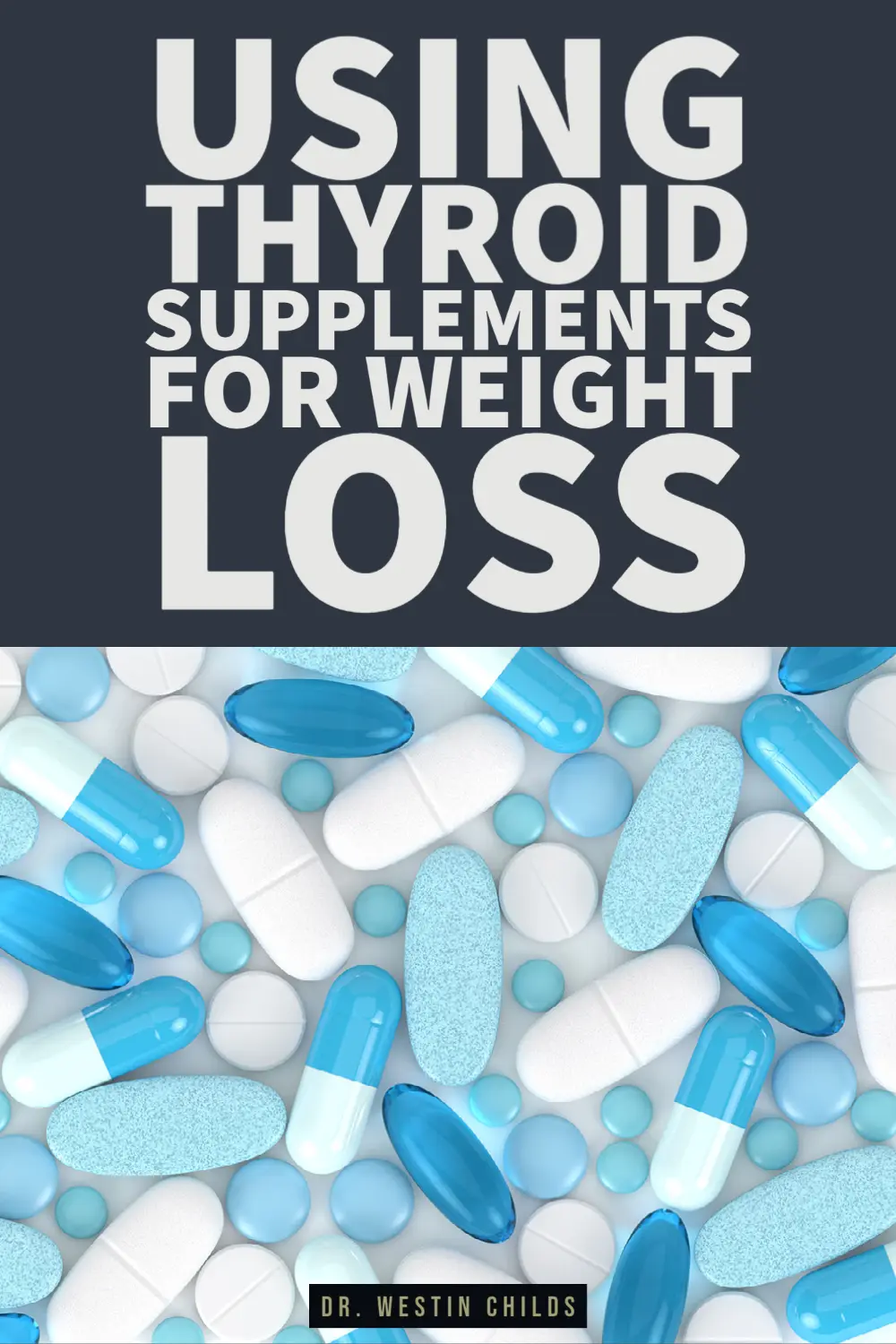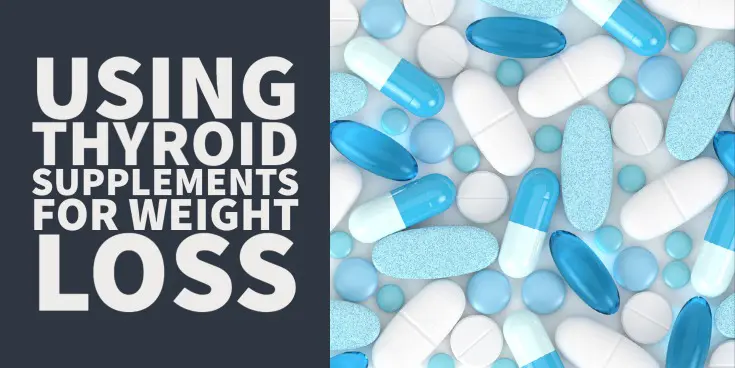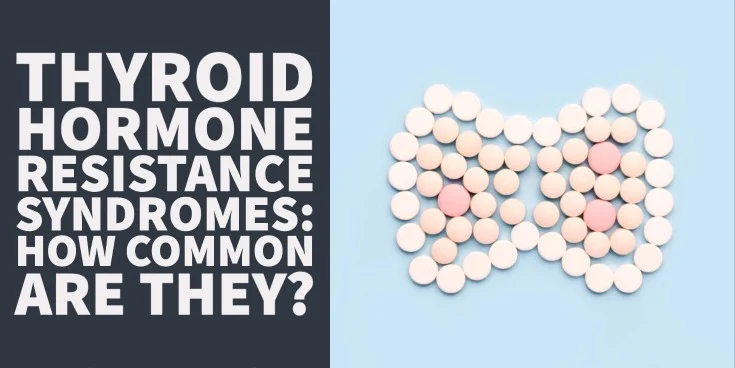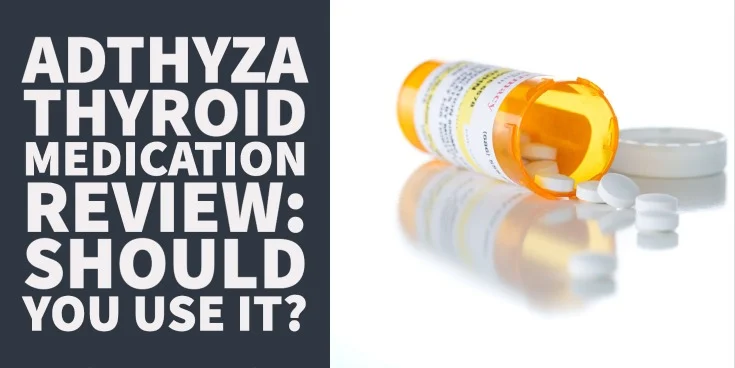Is it possible to take supplements to help you lose weight if you have thyroid disease?
Do they actually work? Or will they not work because of your condition?
I’ve treated thousands of patients with thyroid disease and I can tell you that while some supplements may help with weight loss they are probably not the weight loss cure you are searching for.
Don’t get me wrong, though.
Certain supplements may be able to promote weight loss if combined with other therapies (we will talk more about those below).
But you’ll want to avoid those gimmicky weight loss supplements as they can often cause more harm than good – you know the ones that I’m talking about.
They often sound too good to be true.
In this article, I’m going to dive into weight loss supplements that actually work for thyroid patients, which supplements you should avoid, and why thyroid patients deal with weight problems, to begin with.
Let’s jump in:
Dealing with Weight Gain & Thyroid Disease
If you are one of the many patients with thyroid disease (there are millions in the United States and around the world) then you probably are also suffering from weight gain.
But why do thyroid patients tend to suffer from weight loss resistance and weight gain?
Why is there a need for them to turn to supplements to help? And do they actually help?
The reason for this issue has to do with how your thyroid functions in your body.
As you probably know, your thyroid is the major contributor to your metabolism.
This means that if you have any problem with thyroid hormone production it will result in a sluggish metabolism (1).
What does that mean?
From a practical standpoint, it means that your body will be burning fewer calories than what is normal for your weight and height.
This will almost always result in some weight gain.
This is complicated even further by the fact that many thyroid patients are also being undertreated with thyroid medication, especially if they are focusing on TSH as a marker of thyroid status.
If you fit into this category, then it’s no surprise that you may want to turn to supplements, diet, or exercise to help you manage your weight.
DOWNLOAD FREE RESOURCES
Foods to Avoid if you Have Thyroid Problems:
I’ve found that these 10 foods cause the most problems for thyroid patients. Learn which foods you should avoid if you have thyroid disease of any type.
The Complete List of Thyroid Lab tests:
The list includes optimal ranges, normal ranges, and the complete list of tests you need to diagnose and manage thyroid disease correctly!
Can Supplements Help?
Yes! Well, potentially.
But it’s important to realize that supplements are NOT medications.
Medications (such as T3 thyroid hormone, hCG, LDN, etc.) are concentrated compounds that cause very specific effects inside of the body.
These medications are required to go through rigorous testing before they can be released to the public and they must be proven to at least be effective for some people.
Supplements do not have to follow the same rules.
Anyone can create a supplement, slap on a weight loss label, and promote it as a weight loss supplement… even if it doesn’t work.
This is where it can get confusing for many people.
To help you navigate this mess, I’ve included 3 categories of supplements that I have used successfully for patients with thyroid disease to help them lose weight.
As you read these categories, it’s important to realize that I never recommend the use of supplements by themselves for weight loss.
If you go this route you will almost always be disappointed.
Instead, you want to use supplements as a part of your weight loss regimen and strategy and also include other therapies such as diet, exercise, and so on.
When you use supplements in this way they can augment your weight loss and help you feel better.
T3 is King When it Comes to Weight Loss
The first thing you need to know when it comes to weight loss in thyroid patients is that T3 is king.
T3 is the active thyroid hormone and it is this hormone that is responsible for helping you lose weight and turning on your metabolism.
If you are going to take a supplement, then ideally you want it to include ingredients that help your body create more T3.
But how does your body get T3?
It makes it from T4 (otherwise known as thyroxine).
You’ve probably heard of thyroxine before because it is the active ingredient in most thyroid medications (including Synthroid and levothyroxine).
But T4 by itself isn’t active unless your body turns it into T3.
And several nutrients can help either speed this process up or slow this process down.
If your goal is to speed up the conversion of T4 to T3 then you’ll want to find supplements that contain the following:
- Zinc
- Selenium
- Guggul extract
- Vitamin A
- Rhodiola or Ashwagandha
- Plant-derived phytochemicals (to reduce inflammation)
These specific nutrients can either directly (or indirectly) help your body produce more T3 naturally through this conversion process.
I recommend a supplement, such as this one, which contains many of these ingredients in a synergistic blend.
Remember:
This is not primarily a weight loss supplement, but it may help improve the overall function of your thyroid gland and ultimately help you balance your weight.
Protein Powder May Help
Another beneficial supplement is protein powder.
It’s probably better to think of protein powder as more of a functional food rather than a supplement.
Functional foods are products that contain nutrients beyond vitamins, minerals, and macromolecules.
They help promote functions that other foods cannot because they have been enhanced with added ingredients.
Protein powder can become a functional food when it has vitamins, minerals, and anti-inflammatory ingredients added to it.
When using protein powder in this way it can potentially help promote a normal weight in a variety of ways including:
- Promoting a normal appetite
- Providing your body with thyroid-enhancing nutrients (such as vitamins that promote T4 to T3 conversion)
- Promote muscle growth and sustain existing muscle mass (2)
- Enhance gut microbial diversity and promote the growth of beneficial gut bacteria
So what type of protein powder should you look for?
As someone with thyroid disease, you want to be very careful about the type of protein powder that you use.
Protein powders that contain soy (3) or dairy (4) (such as whey protein) are generally not your best bet.
These types of protein can be inflammatory and may cause reactions in thyroid patients who tend to suffer from GI-related problems.
Instead, you’ll want to focus on powders that contain plant-based protein.
You might also find other supplements that meet this criteria but you’ll need to look outside of the typical whey protein powders.
Proteins such as hydrolyzed collagen can also help thyroid patients.
Balancing your Gut Microbiome May Also Help
Another option that is often overlooked is that of probiotics.
And yes, probiotics can potentially help you with weight loss.
But how?
What you may not realize is that there is a complex relationship between the bacteria concentration in your gut, the number of nutrients and calories that you absorb from your food, and the signals that your stomach/gut sends to your brain to help regulate your appetite.
If you have an imbalance of gut bacteria then these signals can become dysregulated.
The result?
Changes to your appetite that promote cravings for unhealthy foods.
Increased absorption of calories which can cause weight gain.
A reduction in your metabolism and thyroid due to inflammation.
But what causes changes to your gut bacteria?

For starters, hypothyroidism itself can result in some changes but also the food that you eat heavily influences the concentration of bacteria in your gut.
It can be difficult to repopulate your gut with healthy bacteria and that’s where probiotics step in.
Probiotics, more specifically multi-strain and high-potency probiotics, can actually help with weight loss in an indirect way.
Taking probiotics may help restore normal gut microbial diversity, promote a reduction in gut inflammation, and improve the signals that your stomach sends to your brain.
This often overlooked strategy is one that you may find helpful, especially if you have thyroid disease.
The key to getting the best results is by using a high-quality, ultra-high-potency probiotic.
You can see an example of the type of probiotic you’d want to use here.
Supplements that Probably Won’t Work
Are there any supplements that you’ll want to avoid if you have thyroid disease?
The answer is definitely yes!
Certain supplements, especially the ‘typical’ weight loss supplements, can actually cause more harm than good.
Most ‘typical’ weight loss supplements work by either reducing your appetite or by attempting to stimulate your metabolism to burn more calories.
The problem with this method is thyroid patients already have a low metabolism (because the thyroid controls your metabolism) and putting more pressure on the metabolism doesn’t actually help to normalize it.
The only way to normalize your metabolism if you have thyroid disease is by promoting thyroid function either by taking thyroid-enhancing supplements or by using thyroid medication.
No amount of metabolism boosters will help normalize your metabolism!
Other supplements, such as those that reduce your appetite, can also cause metabolic damage if they are used long-term.
Thyroid patients are especially susceptible to this effect because their metabolism is usually lower than normal, to begin with.
Supplements you should avoid if you have thyroid disease include:
- Gimmicky weight loss supplements – These are supplements that often make claims that sound too good to be true. If you’ve never heard about a supplement before, if it has few reviews (or if the reviews look fake), then it’s best to save your money and move on.
- Raspberry Ketones (5) – Most studies with raspberry ketones are done on animals (mice) and the results have been conflicting. With better options available it’s usually best to avoid this supplement.
- Orlistat (6) – Orlistat works by blocking the absorption of fat. This is usually not the cause of weight gain in thyroid patients so it generally does not work. Orlistat is technically a medication but it is available over the counter and in places such as Costco and Amazon.
- Garcinia Cambogia (7) – While some people may experience minor weight loss using Garcinia cambogia, these results generally do not extend to people with thyroid problems.
- Hydroxycut (8) – Hydroxycut contains caffeine which attempts to stimulate your metabolism.
Remember:
You’ll always hear stories about some of these supplements that have worked for some people.
It’s easy to latch onto these stories and hope that they work for you. But, let me assure you that while these stories may be true, it doesn’t mean that they will necessarily work for you.
Always do These Things When Taking Supplements
If you decide that you want to take supplements to enhance your thyroid then you also need to be doing a few other things.
The first?
Make sure that you ALSO alter your diet while you take these supplements.
You should be focusing on eating clean, healthy foods that are low in processed sugar and processed ingredients.
Consuming whole foods will help lower inflammation and naturally promote thyroid function in your body.
In addition to altering your diet, you’ll also want to make sure that you add in exercise!
Exercising, especially low-intensity and high-intensity exercises, can help promote muscle growth and enhance your metabolism.
If you aren’t sure where to start, I’ve created a 10-day thyroid reset guide that can help guide you on the basics.
You can also find more information on how to adjust your diet to meet your needs in this post.
As a thyroid patient, you want to make sure that you eat foods that can enhance your thyroid and avoid foods that can potentially block thyroid hormone production.
Bottom Line: Always use supplements with other therapies such as eating a clean, whole-food diet and exercising an appropriate amount for your body and metabolism.
Conclusion
Can you use supplements to help with weight loss if you have thyroid disease?
The answer is not as straightforward as you might like, but the truth is that the right kind of supplements can potentially help you achieve a more normal weight.
The best way to get there is by using supplements that enhance thyroid function, improve your metabolism, and contain ingredients to help your thyroid function.
While you do this, make sure to avoid supplements that can be harmful to your thyroid.
Now I want to hear from you:
Have you used supplements to help you lose weight?
Did they work for you? Why or why not?
Are you planning on trying any of my recommendations? If so, which one?
Leave your questions or comments below!
Scientific References
#1. https://www.ncbi.nlm.nih.gov/pubmed/3330463
#2. https://www.ncbi.nlm.nih.gov/pubmed/25169440
#3. https://www.ncbi.nlm.nih.gov/pubmed/16571087
#4. https://www.ncbi.nlm.nih.gov/pubmed/24078411
#5. https://www.ncbi.nlm.nih.gov/pubmed/28378858
#6. https://www.ncbi.nlm.nih.gov/pmc/articles/PMC3125014/
#7. https://www.ncbi.nlm.nih.gov/pmc/articles/PMC5781311/
#8. https://www.ncbi.nlm.nih.gov/pmc/articles/PMC3118021/








